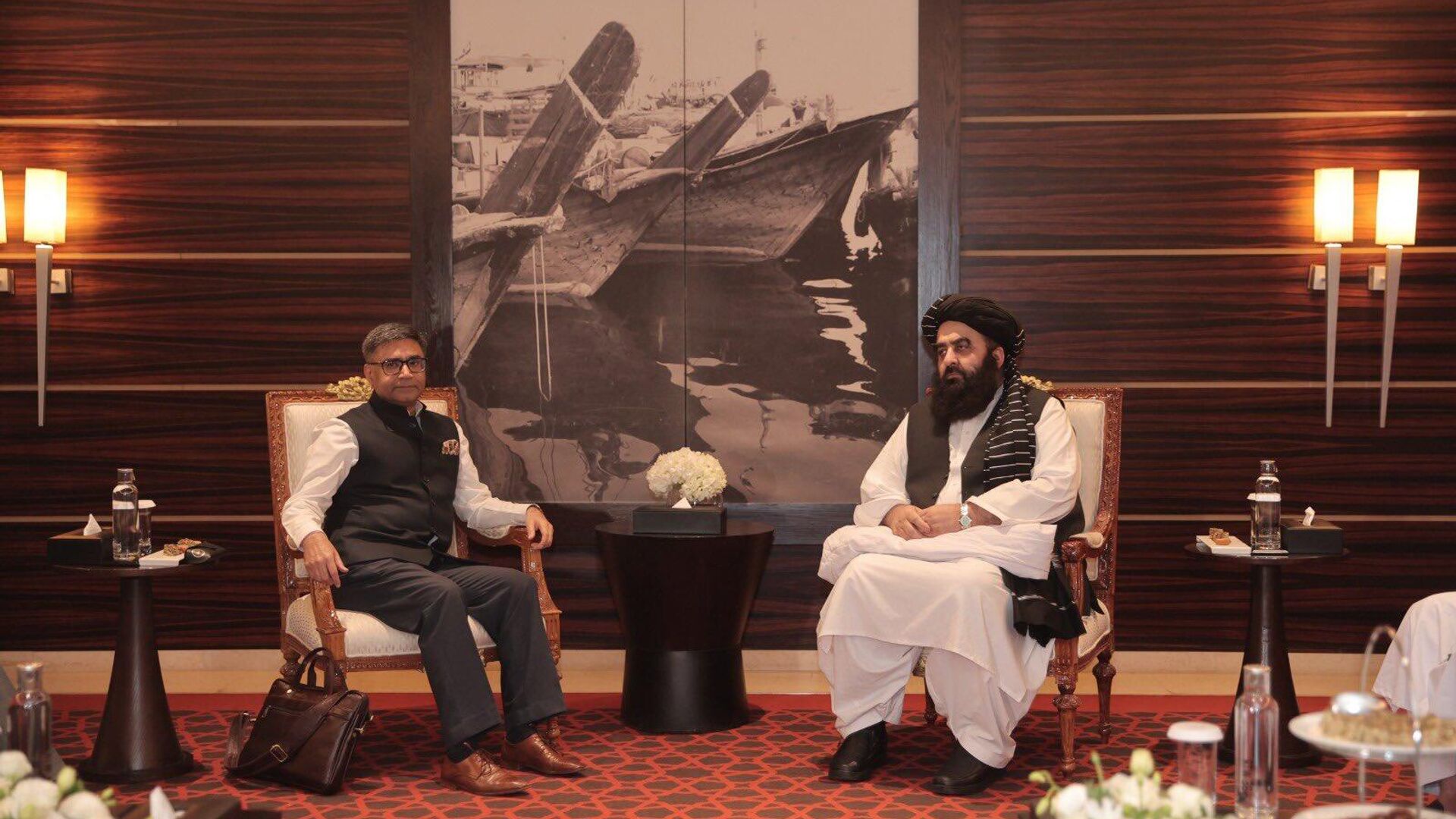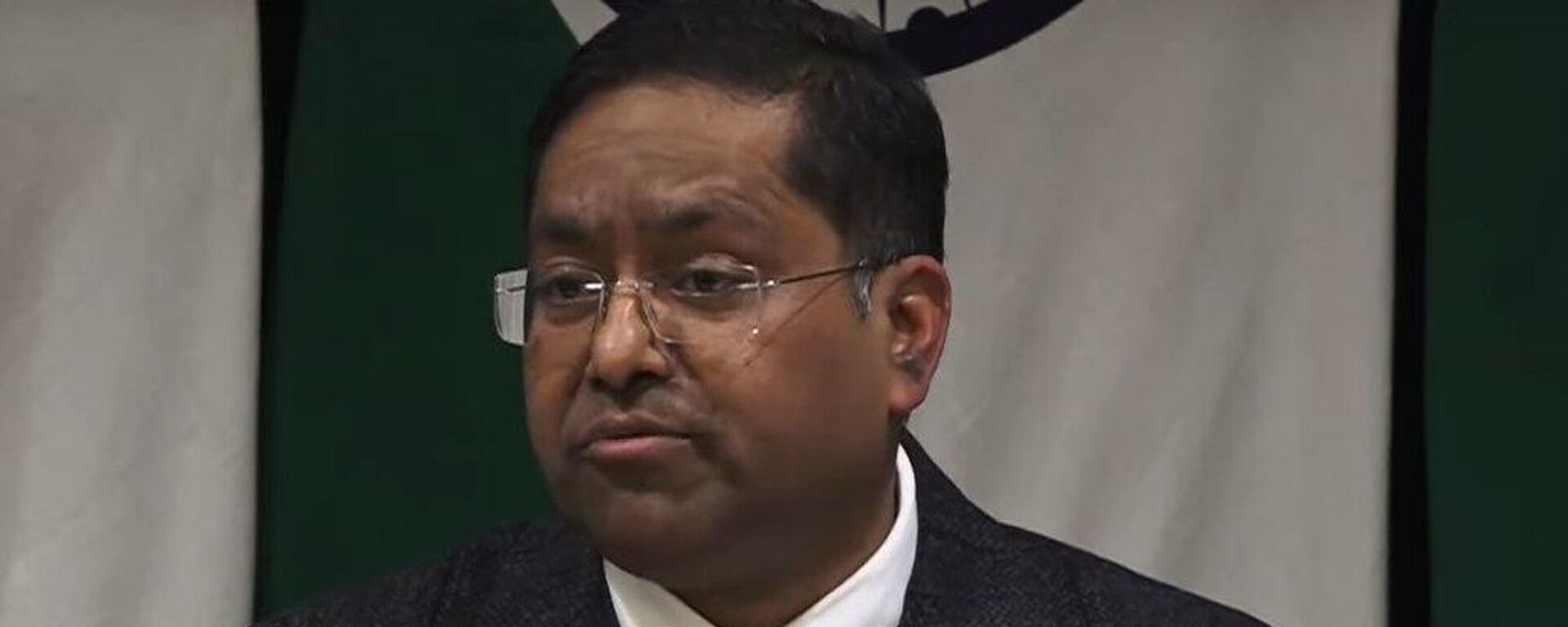https://sputniknews.in/20250111/what-does-indias-burgeoning-partnership-with-the-taliban-mean-for-south-asia-8644361.html
What Does India's Burgeoning Partnership With Afghanistan Mean for South Asia?
What Does India's Burgeoning Partnership With Afghanistan Mean for South Asia?
Sputnik India
In what is being viewed as India's geopolitical game to balance power in South Asia, South Asia's largest nation is now increasing its ties with the Taliban, the current rulers in Kabul.
2025-01-11T08:02+0530
2025-01-11T08:02+0530
2025-01-13T17:56+0530
sputnik opinion
india
afghanistan
pakistan
international energy agency (iea)
tehreek-e-taliban pakistan (ttp)
taliban
eurasia
central asia
afghanistan-pakistan border
https://cdn1.img.sputniknews.in/img/07e9/01/0a/8645515_0:82:1600:982_1920x0_80_0_0_0ccad71c2f6d426fcef63e5f0ecf3728.jpg
The meeting between India's Foreign Secretary Vikram Misri and Afghanistan's Acting Foreign Minister Amir Khan Muttaqi in Dubai on Monday marks a strategic shift in India's engagement with the Taliban, highlighting India's focus on addressing Afghanistan's developmental needs, while steering clear of formal recognition, experts have said.Muttaqi expressed gratitude for India's humanitarian assistance and emphasised the desire to strengthen political and economic ties with India as a key regional player, in line with Afghanistan's economy-focused foreign policy, according to a statement from the Taliban's Ministry of Foreign Affairs on Thursday.Central to the discussions was the emphasis on Chabahar Port, which India views as a critical gateway to Afghanistan and Central Asia, bypassing Pakistan. This underscores India's pragmatic approach to safeguarding its long-term interests, including regional connectivity, economic collaboration, and its role as a stabilising force in South Asia.India’s ongoing investments in infrastructure like the Zaranj-Delaram highway and potential collaboration in resource development showcase its commitment to anchoring Afghanistan in this trading framework. These efforts are complemented by multilateral initiatives and coordination with regional partners such as Iran and Central Asian republics to foster economic development and security, he emphasised."Besides, India's diplomatic overtures seek to mitigate security risks such as cross-border terrorism while maintaining leverage in shaping Afghanistan’s future. By leveraging strategic investments like Chabahar, fostering regional cooperation, and strengthening soft power, India aims to stabilise Afghanistan," Parashar stressed.He believes India's decision to support Afghanistan after Pakistan's airstrikes in Paktika province reflects a strategic move aligned with its regional policy. This response not only addresses immediate stability concerns but also strengthens India's broader objective of countering Pakistan's influence in Afghanistan, the think tanker explained.He added that opposing Pakistan's actions aligns with India's broader objective of ensuring Afghanistan does not become a haven for anti-India elements."India’s support for Afghanistan in this context also helps it maintain a moral high ground in its diplomatic engagement, contrasting with Pakistan’s often unilateral and aggressive policies," the strategic affairs commentator underlined.The Taliban have been actively seeking engagement with India, assuring that Afghan territory will not be used against the country's interests, Nazir Ahmad Mir, a researcher at the Institute for Defence Studies and Analyses (IDSA) highlighted. In return, India has continued providing humanitarian assistance to the Afghan people, he told Sputnik India, noting the positive shift given past experiences between both sides.He expressed concerns that Pakistan's deteriorating relations with the Taliban may create hurdles in the transit of humanitarian aid to Afghan people, while highlighting Chabahar Port as a viable alternative for continuing assistance.While nosedived relations with Pakistan may surprise some, those familiar with the Taliban's evolution over the past decade understand that their approach now differs from the late 1990s, the expert highlighted. The Taliban seek to gain the support of Afghans, many of whom blame Pakistan for their suffering over the past two decades, he added.Moreover, the Taliban are unlikely to concede to Pakistan's demands, such as accepting the Durand Line, he pointed out.* Terrorist organisation banned in Russia and other countries
https://sputniknews.in/20250106/india-condemns-pakistan-for-airstrikes-targetting-civilians-in-afghanistan-8632192.html
india
afghanistan
pakistan
eurasia
central asia
afghanistan-pakistan border
us
jammu and kashmir (j&k)
chabahar port
iran
Sputnik India
feedback.hindi@sputniknews.com
+74956456601
MIA „Rossiya Segodnya“
2025
Pawan Atri
https://cdn1.img.sputniknews.in/img/07e6/0c/13/139630_147:0:831:684_100x100_80_0_0_8fa2b25903e7787fe6a2698552c167df.png
Pawan Atri
https://cdn1.img.sputniknews.in/img/07e6/0c/13/139630_147:0:831:684_100x100_80_0_0_8fa2b25903e7787fe6a2698552c167df.png
News
en_IN
Sputnik India
feedback.hindi@sputniknews.com
+74956456601
MIA „Rossiya Segodnya“
Sputnik India
feedback.hindi@sputniknews.com
+74956456601
MIA „Rossiya Segodnya“
Pawan Atri
https://cdn1.img.sputniknews.in/img/07e6/0c/13/139630_147:0:831:684_100x100_80_0_0_8fa2b25903e7787fe6a2698552c167df.png
taliban, india, new delhi, delhi, kabul, ttp, chabahar port, iran, central asia, pakistan
taliban, india, new delhi, delhi, kabul, ttp, chabahar port, iran, central asia, pakistan
What Does India's Burgeoning Partnership With Afghanistan Mean for South Asia?
08:02 11.01.2025 (Updated: 17:56 13.01.2025) In what is seen as India's strategy to balance power in South Asia, the region's largest nation is now strengthening its ties with the Taliban, the current rulers of Afghanistan.
The meeting between India's Foreign Secretary Vikram Misri and Afghanistan's Acting Foreign Minister Amir Khan Muttaqi in Dubai on Monday marks a strategic shift in India's engagement with the Taliban, highlighting India's focus on addressing Afghanistan's developmental needs, while steering clear of formal recognition, experts have said.
Muttaqi expressed gratitude for India's humanitarian assistance and emphasised the desire to strengthen political and economic ties with India as a key regional player, in line with Afghanistan's economy-focused foreign policy, according to a statement from the Taliban's Ministry of Foreign Affairs on Thursday.
Central to the discussions was the emphasis on Chabahar Port, which India views as a critical gateway to Afghanistan and Central Asia, bypassing Pakistan. This underscores India's pragmatic approach to safeguarding its long-term interests, including regional connectivity, economic collaboration, and its role as a stabilising force in South Asia.
Chabahar Port aligns with India’s broader strategy to integrate with the International North-South Transport Corridor (INSTC), linking India to Central Asia and beyond, and Afghanistan's inclusion in this network offers economic stability and trade opportunities, reducing reliance on Pakistan while counterbalancing China's influence through the Belt and Road Initiative (BRI), Shushant VC Parashar, a Research Fellow at the military think tank Centre For Land Warfare Studies (CLAWS) told Sputnik India on Friday.
India’s ongoing investments in infrastructure like the Zaranj-Delaram highway and potential collaboration in resource development showcase its commitment to anchoring Afghanistan in this trading framework. These efforts are complemented by
multilateral initiatives and coordination with regional partners such as Iran and Central Asian republics to foster economic development and security, he emphasised.
"Besides, India's diplomatic overtures seek to mitigate security risks such as cross-border terrorism while maintaining leverage in shaping Afghanistan’s future. By leveraging strategic investments like Chabahar, fostering regional cooperation, and strengthening soft power, India aims to stabilise Afghanistan," Parashar stressed.
He believes India's decision to support Afghanistan after Pakistan's airstrikes in Paktika province reflects a strategic move aligned with its regional policy. This response not only addresses immediate stability concerns but also strengthens India's broader objective of countering Pakistan's influence in Afghanistan, the think tanker explained.
"The geopolitical game India is navigating here involves multiple dimensions. First, India aims to maintain goodwill with the Afghan people and the Taliban administration without extending formal recognition to the regime," Parashar expressed.
He added that opposing Pakistan's actions aligns with India's broader objective of ensuring Afghanistan does not become a haven for anti-India elements.
"India’s support for Afghanistan in this context also helps it maintain a moral high ground in its diplomatic engagement, contrasting with Pakistan’s often unilateral and aggressive policies," the strategic affairs commentator underlined.
India’s criticism of Pakistan highlights its stance against actions that threaten stability, while its support for Afghanistan aims to safeguard national interests and promote regional peace, he said.
The Taliban have been actively seeking engagement with India, assuring that Afghan territory will not be used against the country's interests, Nazir Ahmad Mir, a researcher at the Institute for Defence Studies and Analyses (IDSA) highlighted. In return, India has continued providing humanitarian assistance to the Afghan people, he told Sputnik India, noting the positive shift given past experiences between both sides.
He expressed concerns that Pakistan's deteriorating relations with the Taliban may create hurdles in the transit of humanitarian aid to Afghan people, while highlighting Chabahar Port as a viable alternative for continuing assistance.
"Furthermore, India needs access to Central Asia to meet its increasing energy demands. For that a transit via Afghanistan remains necessary and if the relations with the Taliban remain functional, it is achievable," Mir stressed.
While nosedived relations with Pakistan may surprise some, those familiar with the Taliban's evolution over the past decade understand that their approach now differs from the late 1990s, the expert highlighted. The Taliban seek to gain the support of Afghans, many of whom blame Pakistan for their suffering over the past two decades, he added.
Moreover, the Taliban are unlikely to concede to Pakistan's demands, such as
accepting the Durand Line, he pointed out.
"India does not figure in Pakistan-Taliban relations. However, India will closely monitor the situation, particularly because the TTP* [Tehrik-e Taliban Pakistan] is considered a terrorist organisation. Therefore, as long as the situation remains limited between Pakistan and the Afghan Taliban, India is unlikely to take sides," Mir concluded.
* Terrorist organisation banned in Russia and other countries



